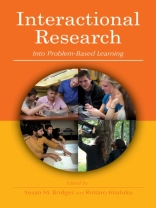Problem-based learning (PBL) has been deployed as a student-centered instructional approach and curriculum design in a wide range of academic fields across the world. The majority of educational research to date has focused on knowledge-based outcomes addressing why PBL is useful. Researchers of PBL are developing a growing interest in qualitative research with a process-driven orientation to examining learning interactions. It is essential to broaden this research base so as to support PBL designs and approaches to leading students into higher-order thinking and a deeper approach to learning.
Interactional Research Into Problem-Based Learning explores how students learn in an inquiry-led approach such as PBL. Included are studies that focus on learning in situ and go beyond measuring the outcomes of PBL. The goal is to further expand the PBL research base of qualitative investigations examining the social dimension and lived experience of teaching and learning within the PBL process. A second aim of this volume is to shed light on the methodological aspects of researching PBL, adding new perspectives to the current trends in qualitative studies on PBL. Chapters cover ethnographic approaches to video analysis, introspective protocols such as stimulated recall, and longitudinal qualitative studies using discourse-based analytic approaches. Specifically, this book will further contribute to the current educational research both theoretically and empirically in the following key areas: students’ learning processes in PBL over time and across contexts; the nature of quality interactions in PBL tutorials; the (inter)cultural aspects of learning in PBL; facilitation processes and group dynamics in synchronous and asynchronous face-to-face and blended PBL; and the developing nature of PBL learner identity.
表中的内容
FOREWORD, by Judith Green
EDITORS’ INTRODUCTION: Why Focus on Interactions in Problem-Based Learning?, by Susan M. Bridges and Rintaro Imafuku
SECTION I: Emic Perspectives of Problem-Based Learning Dynamics Through Interactional Research
CHAPTER 1: Qualitative Research in Problem-Based Learning in Health Sciences Education: A Review, by Jun Jin and Susan M. Bridges
CHAPTER 2: Another Piece of the “Silence in PBL” Puzzle:
Students’ Explanations of Dominance and Quietness as Complementary Group Roles, by Vicki J. Skinner, Annette Braunack-Mayer, and Tracey A. Winning
CHAPTER 3: A Framework for Problem-Based Learning: Teaching Mathematics With a Relational Problem-Based Pedagogy, by Carmel Schettino
CHAPTER 4: Facilitating Problem Framing in Project-Based Learning, by Vanessa Svihla and Richard Reeve
CHAPTER 5: Collaborative Learning: Students’ Perspectives on How Learning Happens, by Abdulaziz Almajed, Vicki J. Skinner, Ray Peterson, and Tracey A. Winning
CHAPTER 6: Breaking the Ice: How Students Present Themselves to the Group in an Interprofessional Problem-Based Learning Context, by
Sally Wiggins, Madeleine Abrandt Dahlgren, Mattias Ekstedt, Eva Hammar Chiriac, and Tove Törnqvist
CHAPTER 7: Interactive Discourse in Interprofessional Tutorial Groups: Dealing With Conflicting Views and Meaning Construction, by Rintaro Imafuku, Chihiro Kawakami, Takuya Saiki, Masayuki Niwa, Yasuyuki Suzuki, and Kazuhiko Fujisaki
CHAPTER 8: Are You Still With Us? Managing Mobile Phone Use and Group Interaction in Problem-Based Learning, by Gillian Hendry, Sally Wiggins, and Anthony Anderson
CHAPTER 9: Students’ Strategies for Managing Social Loafers in Problem-Based Learning: Interactional Means of Dealing With Unequal Participation in Group Work, by Robert Mc Quade, Esther Ventura-Medina, Sally Wiggins, Gillian Hendry, and Anthony Anderson
CHAPTER 10: How Can Screen Sharing Support Knowledge Coconstruction in Technology-Enhanced Problem-Based Learning?, by Henrietta Y. Y. Lai, Anita M .Y. Wong, and Susan M. Bridges
SECTION II: New Theoretical Directions and Learning Designs for Problem-Based Learning
CHAPTER 11: The Impact of Transdisciplinary Threshold Concepts on Student Engagement in Problem-Based Learning: A Conceptual Synthesis, by Maggi Savin-Baden
CHAPTER 12: Toward Quality Online Problem-Based Learning, by Susanne P. Lajoie, Stephen Bodnar, Cindy E. Hmelo-Silver, Yuxin Chen, Juan Zheng, Lingyun Huang, and Maedeh Kazemitabar
CLOSING COMMENTARY: Observations from the Outside: Fledgling Researchers’ Perspectives, by Florian Verbeek and Monaliza Maximo Chian
ABOUT THE EDITORS AND CONTRIBUTORS
INDEX
关于作者
Susan M. Bridges is an associate professor and assistant dean of learning and teaching with the Faculty of Education and the Centre for the Enhancement of Teaching and Learning (CETL) at the University of Hong Kong. She also is an adjunct professor at the Australian Catholic University. Her locally and internationally funded research explores the “how” of effective pedagogy in professional education (health professions/teacher education) through interactional and ethnographic approaches.
Rintaro Imafuku is an assistant professor at the Medical Education Development Center at Gifu University, Japan. He received his MA from Monash University and his Ph D from the University of Hong Kong. His research centers on learners’ social interactions and group dynamics in inquiry-led education settings such as PBL, interprofessional education, undergraduate research, and professional identity formation.












